#neopronoun survey results
Explore tagged Tumblr posts
Text
Good Faith Identities Survey
[PT: Good Faith Identities Survey. End PT]
Hi! We've made a survey with the intent to define and discuss the phrase, "good faith identity" within LIOMOGAI and adjacent spaces!
This survey is anonymous and open to everybody! It can be taken multiple times bodily but we ask that each individual only takes it once. Please answer genuinely.
The survey will be closed on the evening of September 10th. Survey results will (ideally) be posted here by September 17th.
We'll be sharing numbers and trends, as well as some of the written responses. If you do not want your written response to be shared with the survey results, please tell us so in the response.
Tagging for reach but no pressure to reblog!
@neopronouns @revenant-coining @mogai-sunflowers @io-archival @blankqueer
@beyond-mogai-pride-flags
193 notes
·
View notes
Text
i can tell i am becoming an old and irritable bastard bc increasingly my response to any kind of post about anything that is discussing a trend, increase/decrease in a thing, any kind of statement about anything material is "do you have a graph?"
"fan creators are getting less engagement than they used to!" do you have a graph?
"romance novels are leading to teens getting into more abusive relationships!" according to which study?
"neopronouns are causing Real trans people to be denied healthcare!" any actual stats on that or...?
"actually people in [group of any kind] all believe-" oh you must at least have survey results to back that one up, right?
"back in the day everyone was-" source?
and honestly it has made my life materially worse because once you notice that people can and will say and uncritically repeat and boost things with just absolutely no evidence whatsoever it makes you want to chew on the human race like a wad of fruit tape
#i am not saying tumblr users need a professional academic standard of proof for anything they believe#i am saying they should have any standards at all. anything above just being told a thing u kinda vibe with and accepting it as fact
899 notes
·
View notes
Note
https://www.louderwithcrowder.com/starbucks-2671873357?fbclid=IwZXh0bgNhZW0CMTEAAR6cA5aqePz1KvFBF9_Io3RzjvvHI7tnBhegD5JRPVFHTl-1mObjnLBCzKySTQ_aem_k7xsKIkUL5w6q0kw8lQeWQ
This is apparently the biggest issue right now. Having to wear a uniform like every other worker. This is why Trump won.
By: Danielle Berjikian
Published: Apr 30, 2025
Starting May 12, Starbucks workers will be required to wear a black or blue shirt, along with khakis or dark denim. This is not something unheard of in the hospitality industry, but many entitled employees are throwing tantrums over this.
[ Continued... ]
--
It's worth remembering that it was a Starbucks employee who went viral in a video crying about how she was rostered for an 8 hour shift on a weekend. This is not the most emotionally stable workforce.
Regarding the dress code, as you can tell from the video posted online, and particularly from the woman with the beard, this is the result of raging, out-of-control narcissism.
They're not protesting something serious like the company not paying them for hours worked, refusing them breaks or unsafe work conditions. They're being "subjected" to a professional dress code consistent with the Starbucks corporate presentation.
The core complaint is that they expect that when they come to work - you know, to do a job professionally in order to earn money and be paid - that this environment must also a forum to "express themselves." They say this explicitly in the video. This is idiotic and the result of children who were never told "no," and who were celebrated for being mediocre, coupled with the bizarre concept of "bring your whole self to work." The idea that work should fulfill all your personal emotional needs, and that failure to accommodate, embrace and celebrate all of the banal and tedious aspects of what you refer to as your "identity" is unfair and even harmful, is detached from reality and needs to stop.
You work to live. You don't live to work.
They think the workplace is about themselves, not about the customers or about the service or about the products, or even just about doing a good enough job to warrant your ongoing employment and income. No, work should be about me, me, ME. It's about my feelings, my validation, my identity, me expressing myself.
Let's not forget that this is an entry-level position. These are unskilled jobs. (For clarity, like any job, yes, you do need to use particular skills to perform a particular job, but as far as Starbucks is concerned anyone can walk off the street and learn them.) Which is to say, these people are far from irreplacable. They do not have any leverage.
The real minimum wage is always $0.
Your neopronouns, "gender identity," genital piercings, condescension and ability to get offended at literally anything are not qualifications. Nor are you entitled to a job.
The correct response should be as Netflix did and inform them that if they're unhappy dressing in a professional manner that conforms to the Starbucks brand, then Starbucks may not be the right place for them. You can either meet very reasonable requirements of being dresed professionally and punctual (see below), or you can try to find a place that does let you wear a leather harness and rainbow tutu and arrive whenever - or if - you feel like it. Good luck with that.
https://ceoworld.biz/2024/07/15/gen-z-workers-and-punctuality-in-the-workplace-a-generational-divide/
A recent survey by Meeting Canary, an AI tool for analyzing work meeting behaviors, revealed that 47% of Gen Z respondents consider arriving 5 to 10 minutes late as still punctual.
These unskilled positions are the ones that organizations are already the most eager to replace entirely with AI, touch screens and robots, so throwing tantrums derived from narcissism and entitlement is really not the way to go here.


youtube
And no, it's really not surprising that people are completely exhausted and done with this shit.
Shut up and pour the coffee.
#ask#Starbucks#entitlement#narcissism#Generation Z#Gen Z#replaceable#starbucks barista#work ethic#religion is a mental illness
6 notes
·
View notes
Text
Xenogender Usage Survey Results
At long last, the results of the Xeno survey have been published! Out of about 160 entries, about 120 were usable! Some of these results will be varying as certain questions were optional.
Results under the cut, because this is a long post and includes graphics. Enjoy!
Q1. Do you have a main/primary gender identity?
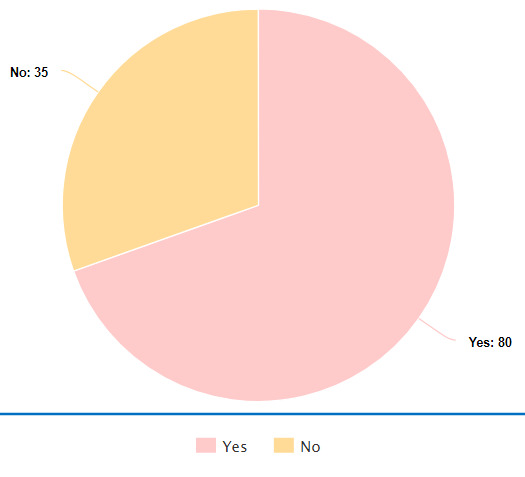
Q2. What is your main/primary gender identity (if yes)?
The top 5 most common 'main/primary' gender identities of respondents to this question were as follows: 5. Trans Man [4] 4. Genderfluid [4] 3. Agender [4] 2. Genderqueer [6] 1. Nonbinary [7]
See the full list of all 'main/primary' gender identities HERE.
Q3. What Xenogenders do you identify with/as?
As this was the BIG ONE, I encouraged folks to give their whole lists, no matter how long they may have been. The top 11 most common xenogender identities of respondents to this question were as follows:
11. Staticgender [x5] 10. Demongender [x5] 9. Chaosgender [x5] 8. Bungender [x5] 7. Xenogender (Standalone) [x6] 6. Glitchgender [x6] 5. Stargender [x7] 4. Pupgender [x7] 3. Autigender [x8] 2. Fictogender [x14] 1. Catgender [x19]
See the full list of all Xenogenders HERE. There are 1,346 genders on this list.
These results were particularly interesting to me, because despite the high amount of respondents, only 2 xenogenders went over 10 responses at all despite the massive overall number. Xenogenders are a very vast 'type' of gender with usually very personalized meanings.
Q4. Do you identify with any non-xenogender identities in addition to the xenogender identities you have?
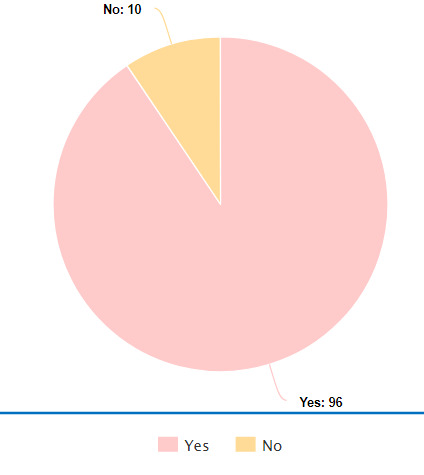
Q5. What non-xenogender identities do you have (if yes)?
The top 11 most common non-xenogender identities of respondents to this question were as follows:
11. Gendervoid [6] 10. Demigirl [6] 9. Male [7] 8. Boyflux [7] 7. Bigender [7] 6. Transgender [11] 5. Genderqueer [13] 4. Genderfluid [15] 3. Agender [21] 2. Transmasc [25] 1. Nonbinary [33]
See the full list of non-xenogenders HERE. I did include neogenders and "cusp" genders in these results. Maybe I'll do a survey on neogenders in the future...
Q6. When talking about your gender(s) ONLINE, do you put more emphasis on your xenogender or non-xenogender identities?
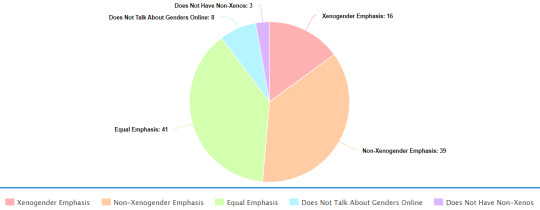
Q7. When talking about your gender(s) OFFLINE/IRL, do you put more emphasis on your xenogender or non-xenogender identities?
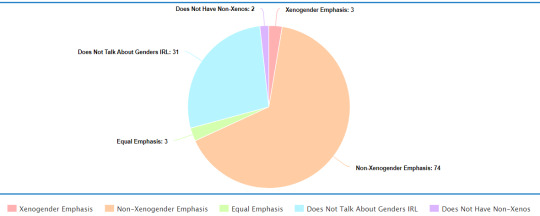
Q8. When thinking about your gender(s) PRIVATELY/PERSONALLY, do you put more emphasis on your xenogender or non-xenogender identities?
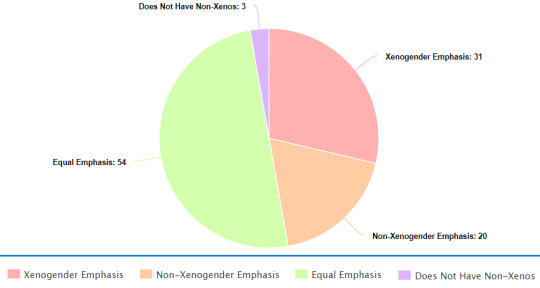
The extreme variance in these charts is really interesting as well. I want to make this survey an annual thing, I'm curious to know if this will change at all over the years.
Q9. Do you use neopronouns? For the purposes of this survey, 'neopronouns' was defined as any pronoun that was not he/him, she/her, they/them, or a combo of them such as she/they.

Q10. What type of neopronouns do you use (if yes)?
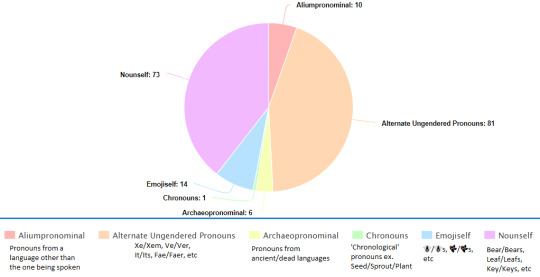
Q11. Do you prefer if people refer to you with your neopronouns or your non-neopronoun pronouns?

Q12. Do you have any additional comments about your xenogenders or neopronouns?
These will be held to the end of the survey as it is the longest section. Q13. Are you Neurodivergent?
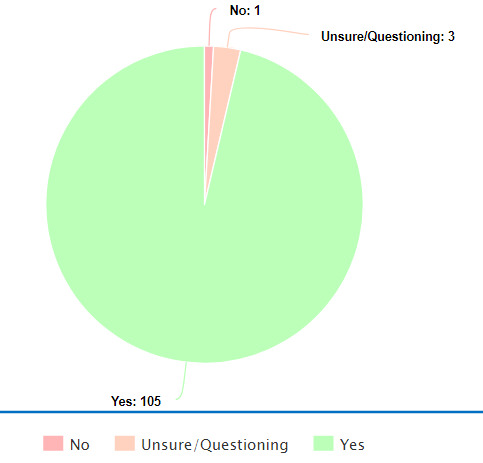
Q13. Do you feel as if your neurodivergence has an impact on your xenogender(s)?
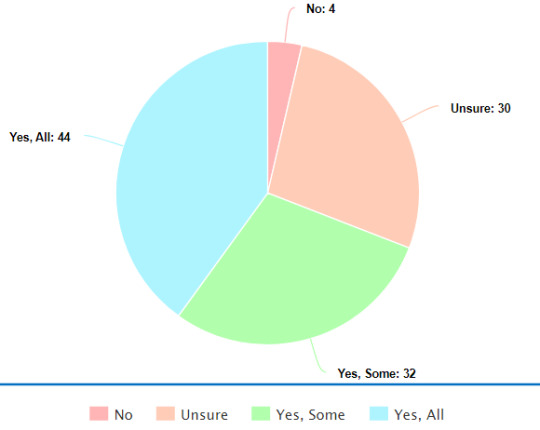
Q14. What types of neurodivergency do you have?
The top 5 most common neurodivergencies of respondents to this question were as follows:
5. C-PTSD [39] 4. ADHD [58] 3. Depression [63] 2. Anxiety [66] 1. Autism [93]
See the full list of neurodivergencies HERE.
I do think these results support my hypothesis that there is a strong intersection of neurodivergency, as well as specifically with autism.
That is the end of the results section! Below are participant comments. I removed comments that clarified on their personal identities or comments directed specifically to me. I found a lot of these very insightful, so even though this section is long, I do recommend reading through them. Thank you to everyone who participated!
COMMENTS ABOUT XENOGENDERS:
>> I believe that there is a huge problem in Xenos where the coiners end up deleting their blogs or presence online so it makes it impossible almost to trace back the gender, as well as there not being a well documented enough place for people to access info on Xenos. The best I found that is specifically only for Xenos is a Wikidot but it doesn't have a lot in terms of some genders imo. There's a weird sort of sense where genders and pronouns become their own lost media, and it's sad. I wish we had a way to properly catalog them as best we could but it's nigh impossible as MOGAI and Xenos were intended to be made where anything could be a Xeno (which is good!) but in the wake, double-coining happens and we lose the ones we did coin in the end. Sorry to ramble oops
>>I think the fact that im otherkin influences my gender identity in major wayss
>>I love my xenos and my genders and i think id like to talk more about it irl.
>>i identify as [gender, removed for privacy] privately and do not share it anywhere outside of my close group of friends. i also only identify with it with my own definition, as every one i've seen online includes concepts (aligning with masculinity/femininity, including european concepts such as royalty, etc) that i either feel uncomfortable with or feel defeat the entire purpose of a xenogender to begin with.
>>We identify the body as sushigender for this reason: Sushi comes in many different styles and fillings, but it's still sushi. Therefore, we can present however we want and it's still us. (It's basically putting a xenogender to describe unlabeled/not caring too much about labels)
>>i wish people (both queer & not) were more accepting that gender expression can be silly and you can have fun with it! sometimes labels are goofy. sometimes pronouns are silly. it doesn't make them any less valid. end the sillyphobia!!!!!!!!!!!!!!!!!!!!!!!!!!!!!!!!
>>i barely attach my xenogenders to my actual gender and its mostly a representation of my entire identity , or some sort of fashion statement or something
>>Most of my xenogenders are private- I do not talk about them other than fairy and livia gender. This is because they are for me and not others, and most people do not need to know about them! :> however, though I will not admit this everywhere, my non-xenogender labels mostly only exist for other people. I am fairygender before I am trans, before I am bigender. I am liviagender before I am trans.
>>Sometimes I like to label, sometimes not, the xenogenders and other genders I identify with are all loose and fluid categories for me.
>>i only use xenogenders and neopronouns with other queer people.
>>i love love love the community this is so cool and i think everyone being able to express themselves is the most important thing in the world
>>I am satisfied with identifying with 'xenogender' as an umbrella term, rather than trying to find and list specific xenogenders I identify with. At least for now. Going to the effort of finding specific xenogenders has not been worth it to me so far.
>>Neurodivergence doesn't intersect with this as much as my alterhumanity does! I am a fairy and a pigeon. Neither has a concept of gender the way humans do. In an ideal world I would not have to fit myself into that system at all! Neurodivergence intersects because it intersects with everything. I am my brain. What it is is what I am. I can't run away from that.
COMMENTS ABOUT NEOPRONOUNS:
>>Most people don't use the neopronouns so it feels wrong to say I prefer them, sense they're never used
>>Honestly I only use my neos with close friends I'm sometimes public abt it but I'm too afraid of backlash sometimes
>>i sort of prefer folks to use my neopronouns purely as a result of most people NOT using them. if people actually used them equally, i would not feel that need to even things out.
>>We do notice people only using the first pronouns you list and ignoring the others (using exclusively she/her when the pronouns are she/they/xe/gem)
>>No one uses them and it makes me really dysphoria but I feel I can't enforce it because there so weird
COMMENTS ABOUT THE INTERSECTION OF NEURODIVERGENCY AND XENOGENDERS:
>>I do genuinely believe a lot of the xenogenders I have are related very specifically to my autism and how I perceive things around me, especially the sound / music related ones.
>>A lot of my overlap comes from perceiving the world around me differently, including my genders and the fluidity of my identity. I feel closer to sounds, concepts, objects, feelings, etc., than I do "typical" and "traditional" gender identities. I understand things more closely and easily in abstracts and metaphors when it comes to my own feelings, so things like "boy" and "girl" don't make much sense to me as a personal experience.
>>Autism affects that indirectly by being a major reason for my alterhumanity
>>My autism effects how I identify myself more than anything most of my xenogenders have to do with my special interests or stuff I feel like due to my autism
>>i have more genders than "usual" because of my multiplicity
>>The intersection most prominently comes from the autism. Being autistic has heavily impacted how I view my role in society and is influenced by a lot of that + my interests
>>autism is the Big one, because it makes me see and literally feel my gender differently to an allistic person. and OSDD-1b affects it only because it's a weird experience being transfem in an afab body, so my gender experience is quite different to singlets who are transfem
>>i think i likely would still experience xenogenders if i was neurotypical, but the fact that i am neurodivergent makes me experience them much more intensely
>>My dissociative disorder (OSDD) and autism majorly effect the way I view gender. It's almost entirely unimportant to me and I see it as more of a form of expression than anything and don't understand why so much stock is put into gender.
>>considering how alienated and disconnected i am from my identity and everyone else, i feel that using xenogenders that feel unclear or 'strange' gives me a sense of identity. i enjoy coming off as strange or offputting to others and like using queerness and nonconformity to express that.
>>my nonhumanity and my aroaceness are a lot more relevant to my gender than my neurodivergencies are.
>>I am not sure if my neurodivergence affects my xenogenders or not, but I know that it affects my overall gender identity, and that is why I label myself as interestfluid.
>>my concept of gender is just weird
>>It’s definitely interesting how a neurodivergency can allow someone to view gender in so many different ways. As an Autistic person, I genuinely do not understand the binary and construct that society has laid out. This in turn affects how I try to conceptualize something that I honestly don’t think *can* be conceptualized. It’s so unique to each person
>>Our autism causes us to see gender from a different perspective so to say. And being a system, other alters also have other perspectives and preferences and identities
#Xenogenders#Xenogender#Neurodivergence#Neurodiversity#Neurodivergent#Survey Research#Survey Results
45 notes
·
View notes
Text
Superlinguo 2023 in review
I spent 2023 on leave to hang out with a new tiny human. I still found time for some linguistics, including regular Lingthusiasm episodes and even some intermittent blogging. I also got to reuse all my linguist pregnancy announcement jokes.
Lingthusiasm
Lingthusiasm turned 7 this year! We celebrated with a dozen main episodes as well as our monthly bonus episodes for patrons. We had some help to get through the year while I was on leave with interviews with linguists from around the world, including Lingthusiasm team members Martha Tsutsi-Billins and Sara Dopierela.
We released our new Etymology isn't Destiny merch, which is available alongside merch for all kinds of linguists and language fans.
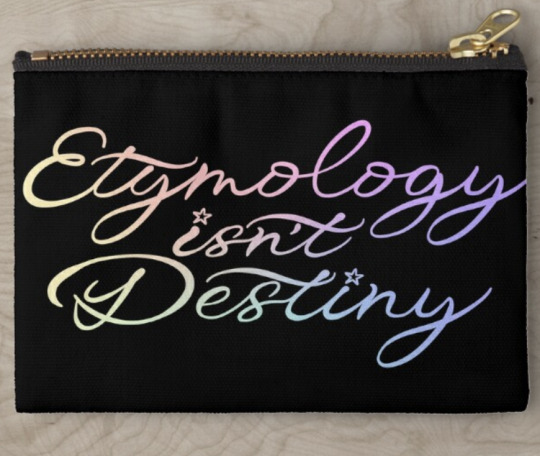
Main episodes
Where language names come from and why they change (transcript)
How kids learn language in Singapore - Interview with Woon Fei Ting (transcript)
Bringing stories to life in Auslan - Interview with Gabrielle Hodge (transcript)
Tone and Intonation? Tone and Intonation! (transcript)
Word Magic (transcript)
The verbs had been being helped by auxiliaries (transcript)
Frogs, pears, and more staples from linguistics example sentences (transcript)
How kids learn Q’anjob’al and other Mayan languages - Interview with Pedro Mateo Pedro (transcript)
Look, it’s deixis, a word for linguistic pointing! (transcript)
Ergativity delights us (transcript)
Revival, reggaeton, and rejecting unicorns - Basque interview with Itxaso Rodríguez-Ordóñez (transcript)
If I were an irrealis episode (transcript)
Bonus episodes
Parrots, art and what even is a word - deleted scenes from Kat Gupta, Lucy Maddox and Randall Munroe interviews
Singapore, New Zealand, and a favourite linguistics paper - 2023 Year Ahead Chat
When books speculate on the future of English
Neopronouns, gender-neutral vocab, and why linguistic gender even exists - Liveshow Q&A with Kirby Conrod
2022 Survey Results - kiki/bouba, synesthesia fomo, and pluralizing emoji
Linguistic jobs beyond academia
LingthusiASMR - The Harvard Sentences
How we make Lingthusiasm transcripts - Interview with Sarah Dopierala
Field Notes on linguistic fieldwork - Interview with Martha Tsutsui Billins
Postcards from linguistics summer camp
Linguistic Advice - Challenging grammar snobs, finding linguistic community, accents in singing, and more
Frak, smeg, and more swearing in fiction - Ex Urbe Ad Astra interview with Jo Walton and Ada Palmer
LingComm: 2023 conference
The 2023 LingComm conference happened in February, and was once again in the LingComm conference space in Gather Town. I enjoyed being on the planning committee that put together an amazing event that built on the inaugural conference in 2021. Stay tuned for 2024 lingcomm updates!
Top Superlinguo posts in 2022
This year was a chance to reflect on the decade since I graduated, and to articulate the important role my main supervisor had in shaping my career.
After wrapping up the linguistics jobs interview series last year, this year was a chance to share some aggregated resources from 8 years and 80 interviews.
I also got to read a couple of great linguistics books for kids, keep up to date with linguistics podcasts, share some of my favourite linguistics books and check in on some things happening online.
General posts and reviews
10 years of a PhD
Barb Kelly
Gender Variations for Person in Suit Levitating Emoji - Emoji Proposal
Linguistics and Language Podcasts (2023 update)
Language Books for Kids: Highly Irregular, Arika Okrent & Sean O'Neill
Linguistics books for kids: Once Upon a Word - a Word-origin Dictionary, Jess Zafarris
Linguistics Jobs resources
Linguistics Jobs Interviews - directory of posts and resources
Linguistics Jobs resource set
Superlinguo Linguist Job Interviews full list
Linguistics education and its application in the workplace: An analysis of interviews with linguistics graduates (new publication in Language)
Information and advice
hapax legomenon and automated email replies
Lingthusiasm guide to pop linguistics books
Hello Grambank! A new typological database of 2,467 language varieties
What we can accomplish in 30 years of lingcomm: Opening keynote of #LingComm23
Australian Linguistic Society’s Accredited Linguist program
Academic articles in 2023
Although I was on leave, things that I was working on earlier made it through to publication. I like that there was one paper on lingcomm, one on gesture (including emoji!) and one on the linguistics job interviews, it feels like a nice mix of some of my current interests. Just a pity there wasn't a Tibeto-Burman paper in there!
Gawne, L. & A. Cabraal. 2023. Linguistics education and its application in the workplace: an analysis of interviews with linguistics graduates. Language, 99(1), e35-e57. [doi][Superlinguo post]
Freestone, P., J. Kruk & L. Gawne. forthcoming. From Star Trek to The Hunger Games: emblem gestures in science fiction and their uptake in popular culture. Linguistic Vanguard, 9(3), 257-266. [doi][Superlinguo post]
Gawne, L., & McCulloch, G. (2023). ‘Communicating about linguistics using lingcomm-driven evidence: Lingthusiasm podcast as a case study’, Language and Linguistics Compass, 17/5: e12499. DOI: 10.1111/lnc3.12499 [doi][Superlinguo post]
The year ahead
I'll be back to work full time. I've found the low-key level of blogging I managed this year to be sustainable, so expect it to be business-as-usual here. Lingthusiasm will also continue with monthly main and bonus episodes, thanks to the patrons who support the show and ensure we have a team that can keep everything rolling while begin to take on more administrative responsibilities in my job.
I'm looking forward to sharing some things that are in the final stages of peer-review and copy editing, and I'm excited to be spinning up some new projects.
Browsing old Superlinguo content?
I have a welcome page on the blog that points you to aggregate posts, and series of posts I've done over the years, as well as themed collections of posts that have appeared on the blog in the last twelve years.
Previous years
Superlinguo 2022 in review
Superlinguo 2021 in review
Superlinguo 2020 in review
Superlinguo 2020 (2019 in review)
Superlinguo 2019 (2018 in review)
Superlinguo 2018 (2017 in review)
Superlinguo 2017 (2016 in review)
Superlinguo 2015 highlights
17 notes
·
View notes
Text

InfoPost.-🫀

"We have gotten the Survey results back from the patient(@akitofr), would you like to see them?"

Aliases(Names): Akio, Sora, Maki, Ai, Rin, Akito, Kanade, Nene, Ame, sparkle, Qiqi, Shiho, Chihiro, Freminet, Rui
Gender: The following question has not been filled in with an answer
Pronouns: The individual answering the survey stated they do not care what pronouns are used on them and that even neopronouns are fine by them
Sexualities: Panromantic, Asexual, Cupioromantic

Enjoys: Art, few friends, Tomatoes, ribbons, dressing up, Baking, Fashion, plushies, socks (Not worn to bed), Soda
Unsatisfied with: Apples, purple cabbage, Mayo, olives, American cheese, the fat on meat, violin Music, Country music, sports, family, direct sunlight, mathematics, bathing suits

Personality types:
Big 5- RLOAN
APsyche- FLEV
MBTI- Isfp-T
Sociotype- Humanist (ell)
Temperament- Helper

Do not interact: Zionists/Israel supporters, Homophobes, Transphobes, paraphiles, Mizuboy/mizucisfem believers, Non-Sharing Yumes(will make exceptions), Anti-double/ "double dni" people, if you hate any colourful stage character I'd rather you not interact, yes I'm seriously about that. [that includes npcs like Arata and Kotaro, but not npcs like Taiga or Harumichi], Qiqi haters, Anti-selfship
Be your friend: I'll be friends with just abt anyone but I'd like ppl in the fandoms im in and who are similar to me (humor wise) (* I'm a minor under 16 by the way keep this in mind)

Fandoms: Vocaloid, Project Sekai, HSR, Genshin, Danganronpa, Bandori, DDLC, NSO, twst, MILGRAM (though I only really talk about Project Sekai and Vocaloid)

Extra:
This account holds many vents and there is way too many things I can warn you about so just proceed with caution here
Tone tags are not necessary if you would not like to use them, if I am confused on the tone of your message I will simply ask what you had meant
I am not diagnosed with anything besides anxiety but I do believe there is more going on with me
Bluesky
Strawpage

Goodbye.-🫁

1 note
·
View note
Text
Neopronouns- Full List
All of the neopronouns found on the survey. All of them.
Part one under the cut
___/___
:)/:)
:]/:]s
:0/:0s
:3/:3/:3s/:3s/:3self
‼️/‼️self
!?/!?self
?!/?!s
?/?
?/??
..°̸͙͊͘ /..°̸͙͊͘
.doc/.doc/.docs/.docs/.docself
.exe/.exe
₍ᐢ.ˬ.⑅ᐢ₎/₍ᐢ.ˬ.⑅ᐢ₎
[ ]/[ ]
[REDACTED]/[REDACTED]s
**/**
*/*s
*e/h*
̴̡͈̜̙̜̫͉͈̲̺̦͕̦̳̒͌͐̓̉̆̀͆̓͘/̴̼̹͑ ̸̛̝̩̫̫̲̱̎͌̇̑̇̑̀̕̕/̵̤̺̣̝͙̱̙͋̋̍̈́̓̽ ̶̛͇̙̺͔̬͓̼̭̭̞̗͖̙͗́̎̆͛͌͝ ̶̨̬̙̤͍̮̗̙̟͉̊͑ͅ/̴̧̧̲̟̏̎͒̍̕ ̷̲̰͔͓͉̜͖̳̝̼̥̅̍ ̸̨̲̈́̎/̴̨̳͎̹̘͇̪͍̤͓͚̳͔̥̐̅̍̾̐̎̓̚͠͠ ̴͚͕̼͉̹̬͓̭̤̯̪͚͔̺̈́̈́̐̔̎̔̽͂́̕self
&/&
#/#
%/%
༄/༄
>:3/>:3
~/~
███/███
☁️/ ☁️
☎️/☎️
☔/☔
☕/☕
☢️/☢️
♂️/♂️
♠/♠
⚙️/⚙️s
⚠️/⚠️
⚡/⚡
⚫️/⚫️
⚰/⚰
⛄️/⛄️/⛄️s/⛄️s/⛄️self
⛓️/⛓️
⛧/⛧
⛽/⛽
✒️/✒️
✨/✨
❄/❄
❔/❔s
❤/❤
❤💛💙/❤💛💙
⬛/⬛/⬛s/⬛s/⬛self
⭐️/⭐️
⭕/⭕/⭕s/⭕s/⭕self
🃏/ 🃏
🌀/🌀s
🌀/him
🌃/🌃
🌆/🌆
🌈/🌈
🌌/🌌
🌎/🌎s
🌑/🌑
🌕/🌔
🌕/🌖
🌙/🌙
🌡️/🌡️
🌥/🌥
🌧/🌧
🌩️/🌩️
🌫️/🌫️
🌱/🌱s
🌲/🌲’s
🌳/🌳s
🌵/🌵
🌶/🌶
🌷/🌷
🌸/🌸
🌹/🌹
🌼/🌼
🌿/🌿s
🍂/🍂’s
🍄/🍄
🍉/🍉/🍉s/🍉s/🍉self
🍒/🍒
🍓/🍓
🍖/🍖s
🍥/🍥
🍩/🍩
🍪/🍪
🍬/🍬
🍭/ 🍭
🍳/🍳
🍵/🍵
🍼/🍼
🎀/ 🎀
🎃/🎃
🎉/🎉s
🎒/🎒
🎞️/🎞
🎠/ 🎠
🎡/🎡
🎤/🎤
🎮/🎮
🎰/🎰s
🎲/🎲
🎵/🎵
🎶/🎶
🎼/🎼
🏹/🏹
🐀/🐀
🐁/🐁
🐇/🐇
🐍/🐍
🐏/🐏
🐐/🐐
🐑/🐑
🐑/💙
🐖/🐖
🐛/🐛
🐜/🐜
🐢/🐢
🐥/🐥
🐦/🐦s
🐧/🐧
🐨/🐨
🐭/🐭
🐰/🐰
🐱/🐱
🐶/🐶s
🐷/🐷s
🐸/🐸
🐺/🐺
🐾/🐾
👁/👁
👁️🗨️/👁️🗨️s
👑/👑
👹/👹s
👻/👻
👽/👽
👾/ 👾
💀/💀
💉/💉
💋/💋s
💌/ 💌
💎/💎
💕/💕
💖/💖
💗/💗
💙/💙
💙/💜
💚/💚
💛/💛s
💠/💠self
💡/💡
💤/💤
💥/💥
💨/💨’s
💫/💫
💽/💽
💾/💾
💿/💿
📄/📄s
📑/📑
📚/📚
📜/📜
📰/📰
🔇/🔇
🔋/🔋
🔌/🔌
🔥/🔥
🔪/🔪
🔮/🔮
🕊️/🕊️
🕯️/🕯️
🕷️/🕷️
🕸/🕸
🕹/🕹
🖊️/🖊️
🖍/🖍
🖤/🖤
🗝/🗝
🗞/🗞
🤡/🤡
🥀/🥀
🥁/🥁s
🥚/🥚
🥝/🥝
🥩/🥩
🥪/🥪
🥫/🥫
🦇/🦇
🦈/ 🦈's
🦊/🦊
🦋/🦋
🦔/🦔
🦕/🦕
🦝/🦝
🦠/🦠
🦴/🦴
🦷/🦷
🧀/🧀s
🧟♂️/🧟♂️
🧡/🧡
🧪/🧪
🧱/🧱
🧸/🧸
🧼/🧼
🩹/ 🩹
🪐/🪐
🪱/🪱
🪲/🪲
🪵/🪵’s
🪶/🪶
🫀/🫀
😈/😈
😴/😴
🙂/🙂s
🚂/🚂
🛸/🛸
2b/2b
3/3self
3/3z
3√2/3√2
3rr0r/3rr0r
4/4s
404/404s
5/5self
5/5z
7/7s
9/9self
a/ace
a/aros
abnu/abnure
abstra/abstract
abyss/abysmal
abyss/abyss
ace/ace
ae/ae
ae/aem
ae/aer
ae/aether
ael/ael
aeon/aeon
aerixa/aerixae
aethr/aethrs
af/afself
agri/agrius
ai/ai
ai/aim
ai/ain
al/ala
al/allium
ala/alum
alien/alien
all/alls
alli/allium
alt/alter
an/anself
Andromeda/Andromeda's
ang/angel
angel/angel
anny/andro
another/anotherself
ant/ant
ap/aps
aqua/aquas
ar/ars
ar/arso
arcade/arcadeself
arcade/arcem
arcane/arcane
arch/archer
aro/aroself
arson/arsons
art/artself
ast/aster
astro/astroself
ato/atom
au/aur
au/auti
autumn/autumnal
ax/axo
axo/lotl
az/az
azu/azur
ba/bat
baa/baa
bam/bang
ban/ana
ban/banner
bard/bards
bark/bark
bast/bastard
bat/bat
be/berry
be/rym
bea/bea
bea/bead
bea/beam
bead/bead
bean/beans
bear/bears
beau/beaus
beauty/beautys
bee/bee
bee/bem
bell/bell
bendy/bendy
ber/berry
berr/berry
berry/berries
bet/bets
bey/bem
bid/bids
bim/bim
bir/birds
bit/bit
bit/bite
bite/bite
bl/blue
bla/blade
black/black
blade/blades
blank/blank
blast/blast
blip/blip
blo/bloom
bloo/blood
bloo/blook
blood/bloods
blook/blooky
bloom/bloom
bloop/blooper
blrrp/blrrrps
blu/blu
blu/blue
blu/blur
blue/blue
blur/blurs
blush/blushs
bo/boar
bo/bole
bo/bolt
bo/bon
bo/bone
bo/bos
bog/bog
bomb/bomb
bon/bone
bon/bonk
bon/bons
bone/boneself
bonk/bonk
boo/boo
book/book
boom/boom
boop/boops
bop/beep
bork/bark
bot/bots
boun/bounce
boy/boy
brack/bracken
brain/brains
bread/breadself
breeze/breeze
bri/bright
bright/brightself
bro/bros
bu/buck
bu/buzz
bub/bubble
bubble/bubble
buck/buck
bug/bug
bumble/bee
bun/bun
bun/bunny
bun/bunz
bunnydog/bunnydog
burn/burns
buzz/buzz
byte/byte
ca/can
ca/cand
ca/care
ca/catta
ca/nine
cae/caer
cake/cakeself
calm/calms
cand/candied
candel/candel
candi/candiself
candle/candles
candy/candie
candy/candy
cap/tain
card/cards
care/cares
cat/catboy
cat/cats
cat/nip
catboy/catboy
catdog/catdog
caw/caw
caw/crow
ce/cedar
ce/cem
ce/cer
ce/cir
ce/lai
cel/celes
cel/celest
cel/cem
cha/chase
chae/chane
chai/chaim
chai/chain
champ/ion
chao/chaos
chaos/chaos
chaotic/chaoticself
chat/chatter
chem/chemic
cher/chers
cherry/cherries
chet/chets
chev/chevalier
chew/chew
chi/chime
chi/chir
chi/chirp
chir/chirp
chirp/chirps
cho/choco
cho/chos
chocolate/chocolate
chomp/chomps
chor/chorus
chord/chord
chron/chrono
chrrp/chrrps
ci/ciph
ci/cipher
ci/circ
cie/cier
cin/cinna
cinna/cinnas
cit/rys
citru/citrus
cla/claw
clemen/tine
cli/click
click/clicks
clink/clink
clo/clos
clo/cloud
clo/clove
clock/clocks
clot/clots
cloud/cloud
clow/cloud
clow/clow
clown/clown
co/cem
co/coal
co/cobble
co/cocoa
co/code
co/coin
co/con
co/copy
co/cos
co/cotton
co/ney
cocoa/cocoa
coffee/coffeeself
cog/cog
coi/coin
coin/coin
cola/colas
color/colors
com/comfort
com/comi
com/rade
comb/comb
comfy/comfys
comrade/comrade
con/cons
con/contract
coo/cookie
coo/coos
cookie/cookies
🆒/🆒
cor/cord
cor/corpse
cor/corv
cor/corvid
core/core
corp/corpse
cos/cos
cotton/candy
crackle/crackle
craft/craft
cre/creature
cre/creme
cream/puff
creature/creatureself
crick/et
cringe/cringeself
cro/crow
cro/crown
crow/crown
crow/crows
crown/crown
cru/crumb
crum/crumb
crun/crunch
cry/cryp
cry/crys
cryp/cryps
cryp/crypt
crypt/cryptic
crypt/cryptid
crypt/crypts
cryptid/cryptids
cryst/crystal
cub/cub
cube/cubes
cup/cake
cup/cups
curse/curseself
cut/cuts
cute/cute
cy/cyb
cy/kes
cyc/cyclo
da/damned
da/dan
dae/daem
dae/daer
dae/dark
dae/death
dahlia/dahliaself
dai/daim
dai/daisy
damp/damp
dar/dark
dar/darling
dark/darker
dark/darks
data/data
dawn/dawns
dawn/dusk
day/enu
daze/daze
de/cay
de/decay
de/dem
de/demon
de/dew
de/dim
de/mon
dea/dead
dea/death
dead/dead
death/deaths
decay/decay
dei/deim
dei/deity
deity/deity
dem/demise
dem/demon
demon/demons
den/den
deox/deox
des/despair
des/pai
detect/detect
dex/dexself
dey/dem
di/devi
di/dice
di/dip
di/div
dia/dem
diamond/diamonds
did/div
die/dies
dino/dino
dino/saur
dip/dipp
dir/dirt
dirt/dirt
disc/disc
disc/discord
discord/discords
div/divs
divine/divineself
do/doe
doggy/doggy
dol/doldrum
doll/doll
doom/day
dora/doras
dorm/dormi
dot/dot
dra/drag
drae/draer
dragon/dragons
dre/dream
dread/dreadself
dream/dreams
dream/dreamy
dree/drem
drop/drip
drowse/drowse
dsic/discord
du/dusk
dude/dudeself
duke/dukes
dus/dust
dusk/dusk
dust/dusts
e/em
e/er
e/es
e/fe
e/im
e/ver
earth/earths
ec/echo
ech/echo
echo/echos
ee/eel
ee/vees
eev/eevs
eevee/eevees
egg/eggy
el/eld
el/elk
el/els
el/stel
eld/eld
elle/stelle
elm/elm
em/er
ember/ember
emo/emos
empty/empty
en/by
en/en
en/end
en/enter
en/entity
end/ended
end/ender
end/ends
ender/enders
endo/endos
eni/enis
entity/entity
eon/eon
er/ero
eri/eri
error/error
eso/esos
esp/espi
et/et
etc/etcs
etern/eternity
eth/eth
ether/ethereal
eu/euch
ev/ever
ev/evil
eve/evil
ex/extra
exe/exe
ey/em
ey/eye
eye strain/eye strain
eye/eyes
eyn/eyn
f/fself
fade/fades
fae/fae
fae/faem
fae/faer
fae/fake
fae/fem
faery/faery
fai/fairy
fairy/fairy
fall/fallen
fang/fang
fang/fangz
far/farce
fate/fates
faun/faun
fawn/fawn
fay/fay
fe/fel
feath/feather
feather/feathers
fee/fi
fel/feli
fel/fels
fen/fen
fer/fern
feral/feral
fern/fern
ferret/ferrets
fey/fern
fey/feyr
fi/fir
fi/fire
fic/fiction
fie/fire
fin/fins
fir/fir
fish/fish
five/fiveself
fiz/fiz
fizz/fizz
fizz/fizzy
fl/flu
fla/flame
fla/flare
flame/flame
flar/flareon
flare/flares
fle/flesh
fleur/fleur
fleur/fleurn
fli/flight
fli/flit
flick/flicker
flo/float
flo/flor
flo/flower
floccinaucinihilipilification/floccinaucinihilipilification
flow/flows
flower/flowers
fluff/fluff
fo/ster
fog/fog
fool/fools
for/forest
four/fours
fox/fox
fra/frost
fre/fir
freak/freak
fri/fri
friend/friends
fro/frog
fro/fronds
frog/frogself
fru/fruit
fruit/fruit
fu/fuzz
fuck/fucker
fuck/you
fun/fun
funeral/funeral
fungi/fungiself
fur/furs
fuz/fuzz
fuzz/fuzz
fy/fyre
fyr/fyr
g/gself
ga/gal
ga/game
ga/me
gala/galaxy
galaxy/galax
gall/gallant
gam/gamble
game/gameboy
game/games
gas/gases
gaso/gasoline
ge/geist
ge/gem
gear/gear
gem/gem
gender/gender
germ/germs
ghast/ghastself
#this is literally so long i had to split it into two posts#tumblr wouldn't let me post it otherwise#pronoun list#neopronoun list#neopronoun survey results
245 notes
·
View notes
Text
You phrased that really well, it's something that's been floating around in my head for a while but I never quite knew how to explain it. I've been telling my friends "I like the word queer! It means weird, and you know what? I am weird! And I like being weird!"
Also, a lot of the idea of normalcy is based on neurotypical societal, well, norms. So I checked something on the survey data.
Out of all the 252 people who used queer as a label for either their orientation or their gender, five were neurotypical. That's not even 2 percent (1.984%). So I think "q is a slur" has an element of ableism invovled.
Hot take: One of the things at the root of the "q is a slur" discourse is that exclusionists base their activism on expanding the definition of "normal", while inclusionist activism is about destroying the concept of "normal".
I mean of course everyone knows the issue is not queer being a reclaimed slur, gay and lesbian are reclaimed slurs too and no one has any problem with that. Exclusionists single out the word queer because of what it stands for. Because it is ambiguous and inclusive, yes, but also because it says "not normal", it embraces deviating, openly defying normativity, being different.
I've seen "q is a slur" people say that they are specifically against that word because they don't want to be seen as strange, because their fight is about being accepted as "normal". I've had an aphobe tell me people saying "demisexual means normal" is a privilege because actually oppressed people want to be seen as "normal" and me wanting my identity to be acknowledged is oppression fantasy. Apparently to them normalcy is so important that having your identity erased is a good thing.
Queer people are oppressed because the world doesn't see us as normal, and to exclusionists the solution is expanding the box of normalcy to fit themselves into it. To them that's what Really Oppressed people should do, and those of us who embrace queerness are privileged because we want to call ourselves "freaks". To them any identity that is ambiguous or out of the ordinary, be it microlabels, neopronouns, xenogenders, aspec labels, m-spec labels or anything else is too weird and "makes the community look bad", because their activism hinges on allocishet acceptance and anything that doesn't fit in a box and cannot be defined easily is not oppressed enough for their taste.
Tl;dr: the "q is a slur" discourse and obsession with normal is just licking the boots of conformity and exclusionist activism is about fitting into the "normal" of the cisheteronormative world, while inclusionist activism entails defying the oppressive construct of "normal". Thank you for coming to my Ted talk.
Exclusionists dni, as always :D
#queer is not a slur#queer#queer pride#neopronoun survey results#you put it really well op thank you#queue/queer
472 notes
·
View notes
Text
Tumblr KOTLC Fandom- Pronoun Demographics
From the survey @an-ungraeceful-swan and I made, here are the results of the question asking "What pronouns do you use?" Participants each wrote in an answer. There were 94 responses.
@tiergan-andrin-alenefar
Hypothesis: There will be more xe/xem users than he/him users
(note: 19 people used all pronouns, so 19 was added to the number of pronouns explicitly specified for each pronoun set)
(another note: all decimals are rounded to the tenths place)
In order of most commonly used pronouns, we have
they/them, at 61 total users (~64.9%)
she/her, at 58 total users (~61.7%)
he/him, at 37 total users (~39.4%)
xe/xem, at 31 total users (~33.0%)
ae/aer, at 30 total users (~31.9%)
fae/faer, at 27 total users (~28.7%)
it/its, at 26 total users (~27.7%)
ey/em, at 21 total users (~22.3%)
ze/hir, at 21 total users (~22.3%)
voi/void, at 20 total users (~21.3%)
cat/cats, at 20 total users (~21.3%)
sea/sear, at 20 total users (~21.3%)
lea/leaf, at 20 total users (~21.3%)
ve/ver, at 20 total users (~21.3%)
disc/discs, at 20 total users (~21.3%)
sil/ver, at 20 total users (~21.3%)
sol/sols, at 20 total users (~21.3%)
star/stars, at 20 total users (~21.3%)
hx/hxm, at 20 total users (~21.3%)
ar/son, at 20 total users (~21.3%)
cy/cyr, at 20 total users (~21.3%)
The data does not support the hypothesis. However, the data does not automatically reject the hypothesis.
Since he/him and xe/xem are the only proportions necessary for this hypothesis, confidence intervals have only been constructed for the two of them. I am 95% confident that the true proportion of he/him users in the KOTLC tumblr fandom is between 29.3% and 49.4%. I am also 95% confident that the true proportion of xe/xem users in the KOTLC tumblr fandom is between 23.3% and 42.7%.
Because of the overlap, there is no significant evidence that either set of pronouns has more users within the KOTLC tumblr fandom.
#kotlc survey#math gay wisdom#xe/xem#neopronouns of the lost cities#shoutout to my 29 new ae/aer best friends#love the number of neopronouns hir yall are amazing#also the way they/them is the highest like... this fandom sure can cisn't#anyway#this was a lot of fun thanks to everyone who filled it out#not me formatting this tumblr post as though my old stats teacher is gonna see it#if my stats teacher is following me on tumblr uhhhh hi but also wtf#kotlc survey results
44 notes
·
View notes
Text
Gender Census 2019 - The Full Report (Worldwide)
This is a long post! You can see a summary of the big three questions here.
~
Hi and welcome to this year’s worldwide report based on the 11,242 responses to the Gender Census, which ran from 25th February until 30th March. It was mostly shared on Tumblr and Twitter, with some Reddit and Facebook and no doubt some one-to-one link-sharing too.
You can see the spreadsheet of results in full here, which might be helpful if you need to see graphs or figures in more detail. For the charts and graphs of statistics over time, the summary spreadsheet can be found here.
~
Q1. IDENTITY WORDS
As in previous years, I asked: Which of the following best describe(s) in English how you think of yourself?
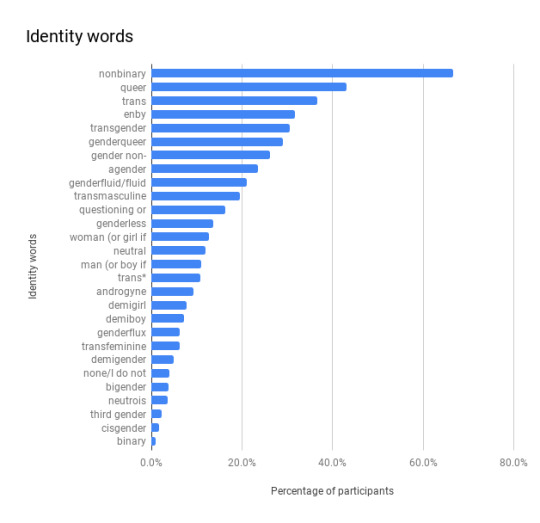
Here’s the top 5:
nonbinary - 66.6% (up 6%)
queer - 43.0% (up 40.1%)
trans - 36.6% (up 1.8%)
enby - 31.7% (up 7.2%)
transgender - 30.4% (up 2.5%)
I put queer in bold because it’s new to the list, and the way it’s rocketed to second place is very unusual... and a little suspicious.
The wording of the identity question carefully avoids mentioning gender so that people without genders feel comfortable answering (or not answering), but it’s not really meant to include sexualities. The exception is sexualities that are part of someone’s gender identity, like this comment that someone wrote into the identity checkbox: “femme lesbian (sometimes i feel like lesbian *is* my gender)”
So anyway, last year queer got 2.9% (over the 1% threshold), and I personally know people who feel that their gender is queer, so I added it to the list. Usually when terms are added as checkbox options it might multiply their popularity by about four, but 43% is way too high to be explained by that. Queer is usually used to describe sexuality, so I think perhaps people who identify as queer in terms of their sexuality might have been selecting it too. I’m considering changing it slightly, to something like “queer (as gender identity)” to clarify it for next year. It’s possible that we won’t know if this percentage is due to bad survey design for a year or two.
(Edit: Some feedback on queer and my response to the feedback can be found here.)
Along those lines, several terms were added to the checkbox options this year because they were typed in by over 1% of participants last year:
queer
genderless
demiboy
demigirl
gender non-conforming
There are now 28 terms in the identity checkbox list, and as usual there were people expressing gratitude for the abundance of checkbox options in the identity question. However, there has also been an increase in people entering words into the textboxes that are already in the checkbox list. That means that people are missing or are not able to find the identity words they connect with more than last year, and it doesn’t help that the list is randomised to reduce primacy and recency bias.
Right now I add words to the checkbox list if they reach 1%, and this year for the first time I am considering adding another system for removing words that are not used as much. You can read a blog post I wrote about that here. I concluded based on the results of the 2017 survey (which asked for participants’ ages) that some words that seem to be used less overall are used more often by participants over 30, and since participants over 30 are underrepresented in online surveys generally I will be keeping any word that they enter over 3% of the time even if the word isn’t used as much overall.
Relatedly, I didn’t ask for ages in the survey this year, but I will be collecting information about age in future surveys to make sure that I don’t remove words and accidentally alienate underrepresented age groups. (The age question will be optional and will give age ranges rather than asking for an exact age, so hopefully that won’t make people feel too uncomfortable.)
This year someone complained for the first time that I was excluding words from other languages because I specify “in English” in the question, and if you know me from previous surveys you know that’s the opposite of my intention! Every word entered is counted, and I’m very aware that people use words from other languages while speaking English. So I’m considering rewording the question, but I welcome feedback on this since I’ve never had anyone complain about this issue before and plenty of people already enter non-English words.
And here’s this year’s top 10 words and their popularity over time:
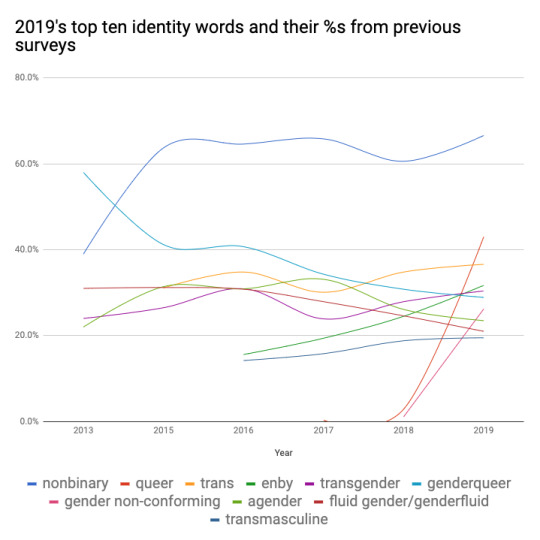
Those two lines shooting up from 2018 to 2019 are two of the words newly added this year: queer and gender non-conforming. That green line starting near the bottom in 2016 and steadily increasing over time is more like what I’d usually expect - that’s enby, which is now up to #4 on the list.
There are no new identity words to add next year; the closest to 1% was butch with 0.7%. However, since I intend to collect information about age and since people often type, for example, “girl but not woman, even though I am not a minor”, I will be splitting girl, woman, man and boy into separate checkboxes next year.
2,021 unique identity words/terms were typed into the “other” textbox, including 413 that were entered more than once. The average number of type-ins for people who actually typed words in was 1.8, and the average words per person overall was 5. Most entered 4 words:
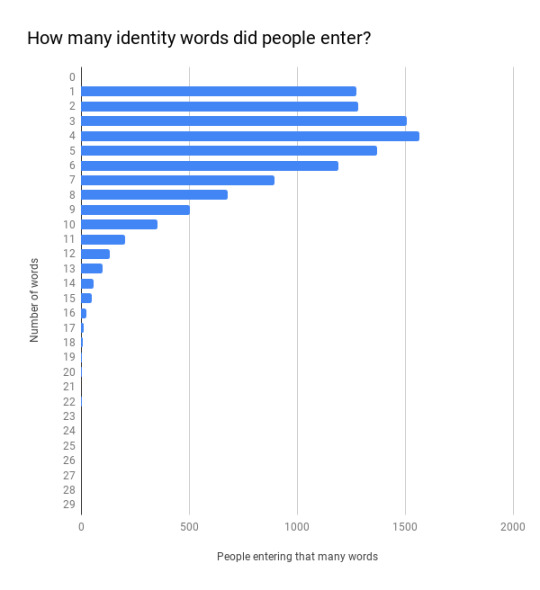
~
Q2: THE TITLE QUESTION
I asked, Supposing all title fields on forms were optional and write-your-own, what would you want yours to be in English? I also clarified that participants should be currently entitled to use it, so they should have a doctorate if they choose Dr, etc.
There were 5 specific titles to choose from, plus a few options like “I choose on the day” and “a non-gendered professional or academic title”. Participants could choose only one, with the goal of finding out what, when pressed, people enter on official records forms and ID.
Here’s our top 5:
No title at all - 33.0% (up 0.6%)
Mx - 31.3% (down 1.3%)
Mr - 8.7% (up 0.2%)
Non-gendered prof/acad. - 5.5% (up 0.1%)
Ms - 4.7% (down 1.0%)
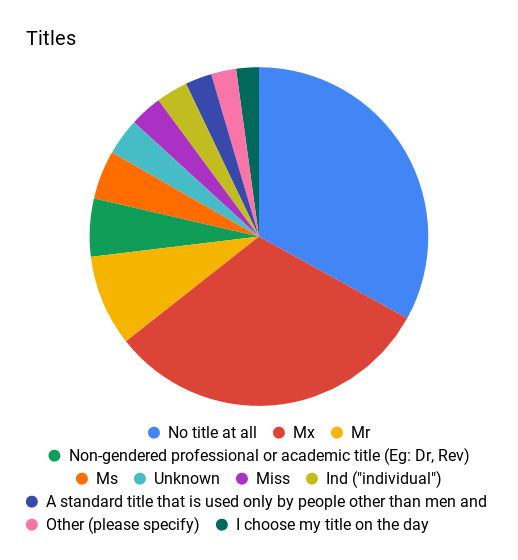
Here’s how that looks compared with previous years:
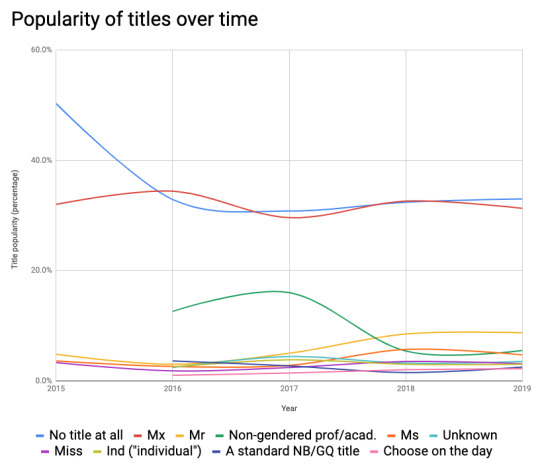
Mx and no title switched places again for the fifth year in a row! And this year I made a similar graph but without Mx and no title. They always get way more than everything else, and it makes it really hard to see what’s going on in the lower half of the graph!
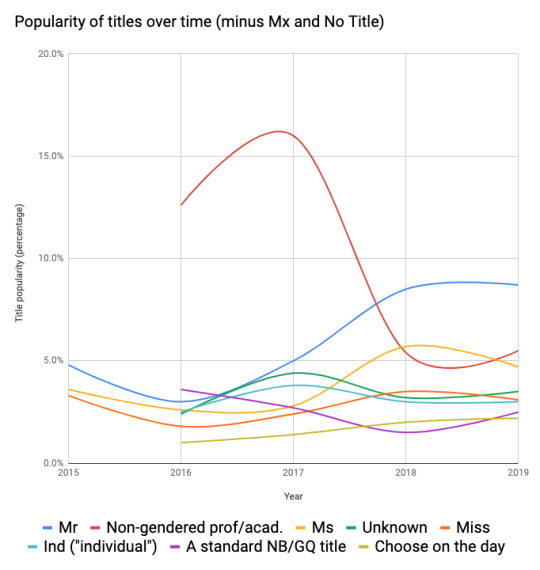
That rollercoaster of a red line is because in 2018 I specified that “non-gendered professional/academic title” should be one that the participant should be entitled to use, which caused that significant drop.
The most popular five “other” textbox titles were:
M - 28 (0.2%)
Comrade - 17
Sir - 10
Mrs - 9
Ser - 7
As with last year, I invited people who chose “a standard title that is used only by people other than men and women” (2.5% of participants) to optionally suggest titles that they’d heard of. The goal is to find a popular title that is considered exclusive to nonbinary genders the way Mr is generally considered exclusive to men and Ms is to women.
243 people checked the “standard exclusive nonbinary” title option, and here’s everything entered more than once:
Mx - 16
M - 4
Xr - 2
Mrs - 2
Mx is generally considered gender-inclusive by people who are familiar with it, especially if their title is Mx, but it’s high on this list because Mx is very well-known generally. M in French is masculine, but in English it’s not gendered and I assume it’s pronounced “em”? (That seems to be what people have said in the notes, but please do tell me if I’m wrong!) It was also the most entered title in the “other” textbox. Xr is new to me, I’m not sure how it’s pronounced.
~
Q3: PRONOUNS
The fourth question was actually a complex set of questions retained from last year, which started with Supposing all pronouns were accepted by everyone without question and were easy to learn, which pronouns are you happy for people to use for you in English? This was accompanied by a list of pre-written checkbox options. It included “a pronoun set not listed here”. and if you chose that it took you to a separate set of questions that let you enter up to five pronoun sets in detail.
As usual, everything that was a pre-written checkbox option got over 1%.
Here’s the top 5:
Singular they - they/them/their/theirs/themself - 79.5% (up 2.1%)
He - he/him/his/his/himself - 30.8% (down 0.4%)
She - she/her/her/hers/herself - 29.0% (down 1.9%)
None/avoid pronouns - 10.3% (up 0.2%)
Xe - xe/xem/xyr/xyrs/xemself - 7.2% (down 0.2%)
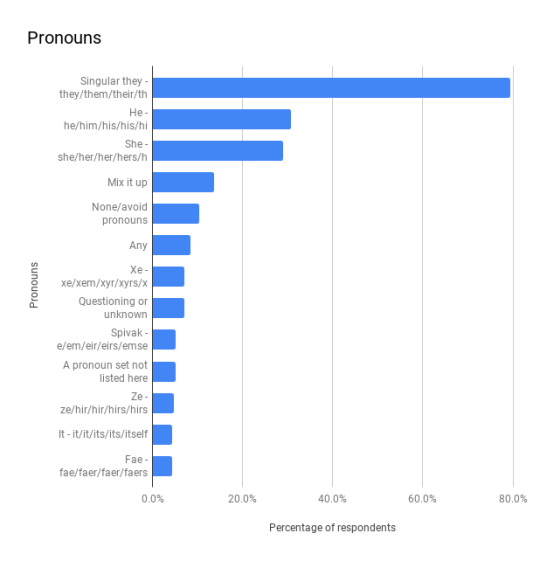
Here’s how that looks over time:
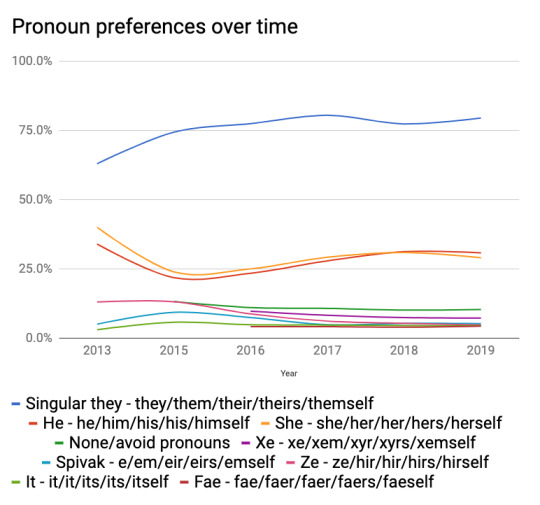
Because singular they, he and she always do better than everything else, let’s look at that chart without them. Every other specific pronoun set got under 8%.
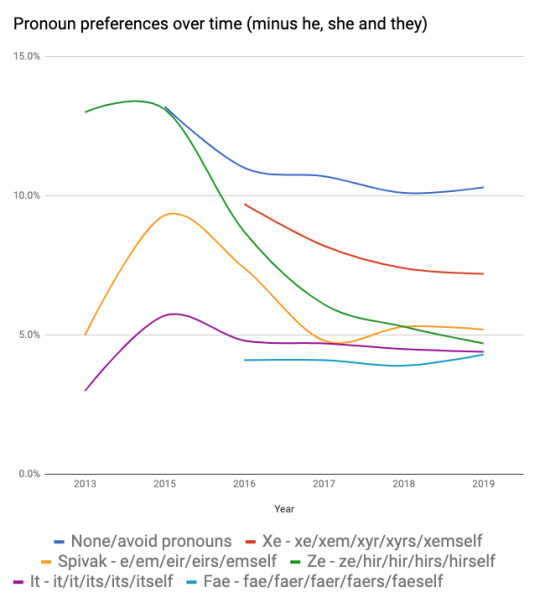
Here’s the top 5 textbox neopronouns, none of which got over 1%:
ne/nem/nemself (singular verbs) - 27 (0.2%)
ve/ver/verself (singular verbs) - 24
ey/em/emself (singular verbs) - 23
ae/aer/aerself (singular verbs) - 22
thon/thon/thonself (singular verbs) - 18
(I’m going by the subject, object and reflexive, because that seems like the best way to collect similar sets together - eyeballing it, the most variations occur in the possessives.)
Half of participants don’t like he or she, and 9% like neither he, she nor they. 695 unique sets of neopronouns were entered by 574 people, of which 84 were entered more than once. The average number of pronouns entered was 2.2, and most people (39%) were happy with one set.
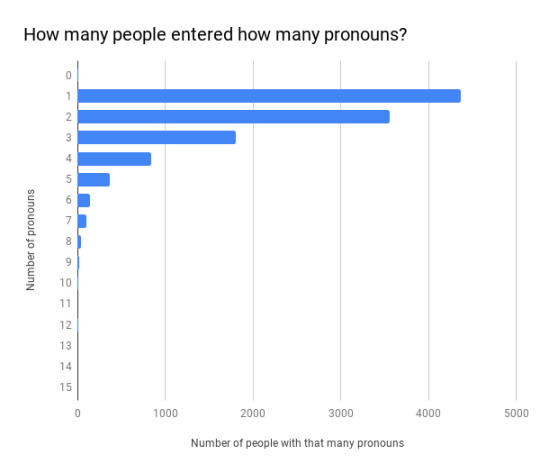
Overall it looks like there are no neopronouns really gaining in popularity, and even the checkbox neopronouns are being used less since 2015.
~
THE QUESTIONS I ASK
What should the third gender option on forms be called? - Still no consensus, but nonbinary is at 2 in 3 people and it does seem to be gradually climbing.
Is there a standard neutral title yet? - Not yet. Mx is still consistently far more popular than all other titles, but just as many nonbinary people want no title at all. It’s really important that activists campaigning for greater acceptance of gender diversity remember to fight for titles to be optional, too.
Is there a pronoun that every nonbinary person is happy with? - No. The closest we have to a standard is singular they, and it’s important for journalists and anyone else with a style guide to allow it. It’s levelled out at about 1 in 5 not being into singular they, and 9% of us don’t like he, she or they pronouns.
Are any of the neopronouns gaining ground in a way that competes with singular they? - No. This year the closest is “Xe - xe/xem/xyr/xyrs/xemself” (7.2%, compared to singular they’s 79.5%). Users of these neopronouns will probably not reach consensus for many years - language and especially pronouns can be very slow to settle and gain ground. Even if one neopronoun does become very commonly used, many will continue to use other neopronouns for a long time to come.
~
THIS YEAR IN REVIEW
Crowdfunding was successful enough that I have a little money leftover for costs next year. We had around the same number of participants as last year, but follower numbers and mailing list subscribers increased, which bodes well for next year.
I made some minor changes to the promotional illustrations to make them more gender-/sex-inclusive, and this year I got no complaints, so that was a good move! However, this year I did see a lot more confusion about who is invited to take part. I think the changes were probably worth it to make sure I’m being as welcoming and inclusive as I can be in the promotional stuff, so hopefully people will err on the side of caution and just jump in.
The way that the new survey software collects information, and my increased knowledge of Google Sheets, mean that I didn’t have to resort to MS Excel at all this year. This is really good, because working with unfamiliar software slows me down a lot! My formulae have been more efficient (thanks to my increasing Google Sheets skillz), so the entire sheet could be processed at once instead of being split into several questions. I’m really happy about that, because it means the entire worldwide results report came out less than 24 hours after the survey closed, instead of... *cough* eight months *cough* ...
I made an executive decision not to do a UK report this year, because the added complication makes it really hard for me to motivate myself. It definitely worked, look at that, it’s only March and the worldwide report is already out! I might still do a UK report, and I will keep collecting UK/not UK info about participants so that I always have that option, but for now I’ll just concentrate on the worldwide report and just do the UK report if I feel like it before 2020. And of course the spreadsheet is available to anyone who wants to download it and play with it, so if someone else wants to make some UK-specific statistics happen that is totally possible.
What I’ll do differently next year
In the identity question, I will keep queer as a checkbox option, but I will specify that it’s a gender. Maybe “queer (as gender identity)”? Feedback welcome on this!
In the pronouns question, I’ll change the wording of “none/avoid pronouns” so that it’s clear that it includes just using someone’s name. That’s because a lot of people tried to enter their names as neopronoun sets to express that, and I want to avoid people entering identifying information.
I will ask about age, to make sure that people over 30 are represented by checkbox options. Typically only about 10% of participants are over 30 so I want to make sure as many as possible are comfortable taking part. I’ll group ages into sets of 5 years (21-25, 26-30, etc.) to reduce risk of people being identified, and because entering an exact age probably feels a little more uncomfortable.
After 2020, any identity word, title or pronoun that is entered by less than 3% of participants and less than 3% of participants over 30 can be removed in future surveys. (I am a little concerned about this part, because it’ll make the work more complicated for me, and more work means more risk of epic procrastination. I’ll do my best!)
I’ve finally admitted to myself that I need to separate man and boy, and woman and girl. Currently it’s “woman (or girl if younger)” and “man (or boy if younger)”, and every year plenty of people skip those options in the checkboxes and type in “girl (but not woman even though I’m not a minor)” or something like that, and next year I’ll be asking about age so that’ll be an easy way to determine if there are any adults who are comfortable with one and not the other. This will increase the number of checkboxes to 30, which is pretty unwieldy and will make it harder yet again for people to find their words and increase the rate at which people drop out of the survey, so I’m glad for the under-3% checkbox removal threshold that I’m introducing from 2021 onwards.
Closing thoughts
I slipped up on a couple of things this year (ambiguity over the word “queer”, for example) - but overall I’m pretty impressed with how well I handled it all compared to last year. (I had recently moved house and was trying to rebuild my life, so I didn’t have a lot of spare energy in 2018!)
As always, I’m excited to pore through all your written answers and feedback, and I’m really grateful to everyone who shared the survey link! There were hundreds of RTs and thousands of reblogs, which never ceases to amaze me. Thank you everyone for sharing a small linguistic part of yourselves with me, I hope putting it all together helps you and makes a positive difference to the world!
See also
A list of links to all results, including UK and worldwide, and including previous years
The mailing list for being notified of next year’s survey
~
SUPPORT ME!
I do this basically for free (the crowdfunded money goes entirely on survey software and domain fees), so if you happened to stumble onto my Amazon wishlist and accidentally fall on an Add To Cart button… well, I would be immensely grateful. ;) If you wanted to go and check out Starfriends.org too I reckon Andréa would be pretty chuffed!
#gender census#results#nonbinary#gender census 2019#survey#pronouns#neopronouns#gender-neutral language#language
376 notes
·
View notes
Text
this is a survey and i'm very interested to see the results so please reblog after answering!
(also everything with two or more pronouns in one option is in any order of preference)
7K notes
·
View notes
Note
As if the neopronoun survey data isn't queer enough, I color coded results to make it rainbow
See this ^^^^ this is what I need to hear on a Sunday. *chef's kiss*
7 notes
·
View notes
Text
Pronouns in the Danger Days Fandom
Results are from this survey, which received responses from 166 individual users.
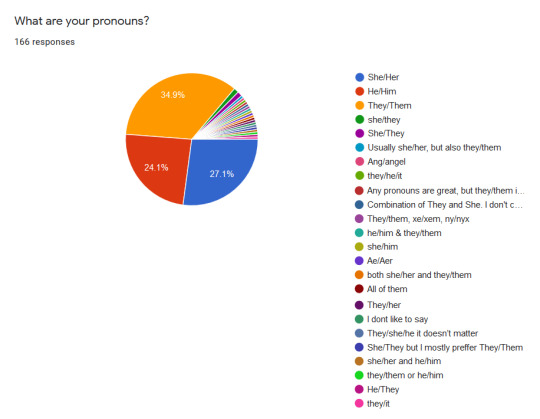
Over a third of the fandom uses exclusively they/them pronouns, and when combined with those who use a combination of they/them and other pronouns, the total is closer to half.
Those who use she/her or he/him, including those who use multiple pronouns, each make up about a quarter of the fandom, with slightly more using she/her than he/him.
Neopronoun users make up a much smaller amount, only about 2% of those who took the survey.
126 notes
·
View notes
Link
Hi everybody! I made a survey in hopes of discovering which neopronouns are most popular, so I’d appreciate it if folks who use neopronouns could take a minute to fill it out! The results will help me update the educational materials in my school’s diversity center. If this survey doesn’t apply to you, feel free to reblog to boost! -Mod Pluto
#nonbinary#genderqueer#non-binary#neopronouns#neo-pronouns#transgender#queer#lgbt#lgbtqia#lgbtqia+#mogai
325 notes
·
View notes
Text
Top Ten Neopronouns
Ranking with he/him, they/them, and she/her not included.
it/its: 267 (50.857%)
xe/xem: 215 (40.952%)
ae/aer: 146 (27.810%)
fae/faer: 126 (24.000%)
e/em: 96 (18.286%)
ve/ver: 92 (17.524%)
ze/hir: 88 (16.762%)
voi/void: 46 (8.762%)
bun/bun: 26 (4.952%)
star/star: 24 (4.571%)
#neopronoun survey results#neopronoun survey#it/its#xe/xem#ae/aer#fae/faer#e/em#ve/ver#ze/hir#voi/void#bun/bun#star/star#voi/void was SURPRISINGLY popular#it was the most common fill-in#and ae/aer made it into top three neos i'm so proud of us#queue/queer
176 notes
·
View notes
Text
Neopronouns and Neurodivergence
Question: Are you some form of neurodivergent?
Options: Yes (self diagnosed), Yes (professionally diagnosed), Unsure, No, and Other (fill in the blank)
Data below the cut.
15 participants (2.857%) are not neurodivergent.
88 participants (16.752%) are unsure.
Of those...
2 (2.723% of unsure participants) specified that they were mentally ill but unsure if they qualified as neurodivergent
3 (3.409% of unsure participants) specified that they were between unsure and self diagnosis.
421 participants (80.190%) are neurodivergent.
Of those...
200 (47.506% of neurodivergent participants) were diagnosed professionally.
196 (46.556% of neurodivergent participants) were self diagnosed.
19 (4.513% of neurodivergent participants) had some conditions self diagnosed and some professional.
5 (1.188% of neurodivergent participants) were in the process of getting diagnosed proffesionally.
1 (0.238% of neurodivergent participants) did not specify.
1 participant (0.190%) preferred not to answer.
Follow-up question: Do you think your neurodivergence is related to your perception of gender and/or pronoun preference?
Options: Yes, No, Unsure, I am neurotypical (N/A)
266 participants (50.7%) responded "yes."
194 participants (37%) responded "unsure."
50 participants (9.5%) responded "no."
15 participants (2.9%) responded "I am neurotypical."
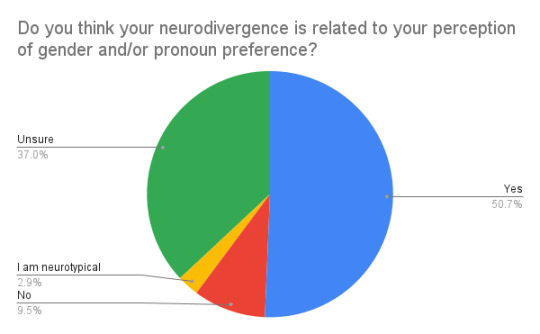
[id: a pie chart depicting the above data]
#neopronoun survey#neopronoun survey results#neopronouns neurodivergent#shoutout to the less than 3% of neurotypical people on the survey#how can people still think neopronouns are ableist... almost like this was never actually about protecting neurodivergent people#and it was about attacking trans people instead#anyway! data. yes. good#queue/queer
60 notes
·
View notes